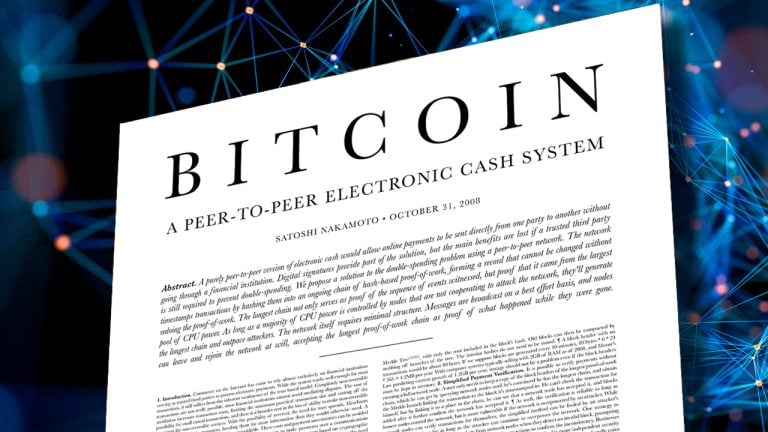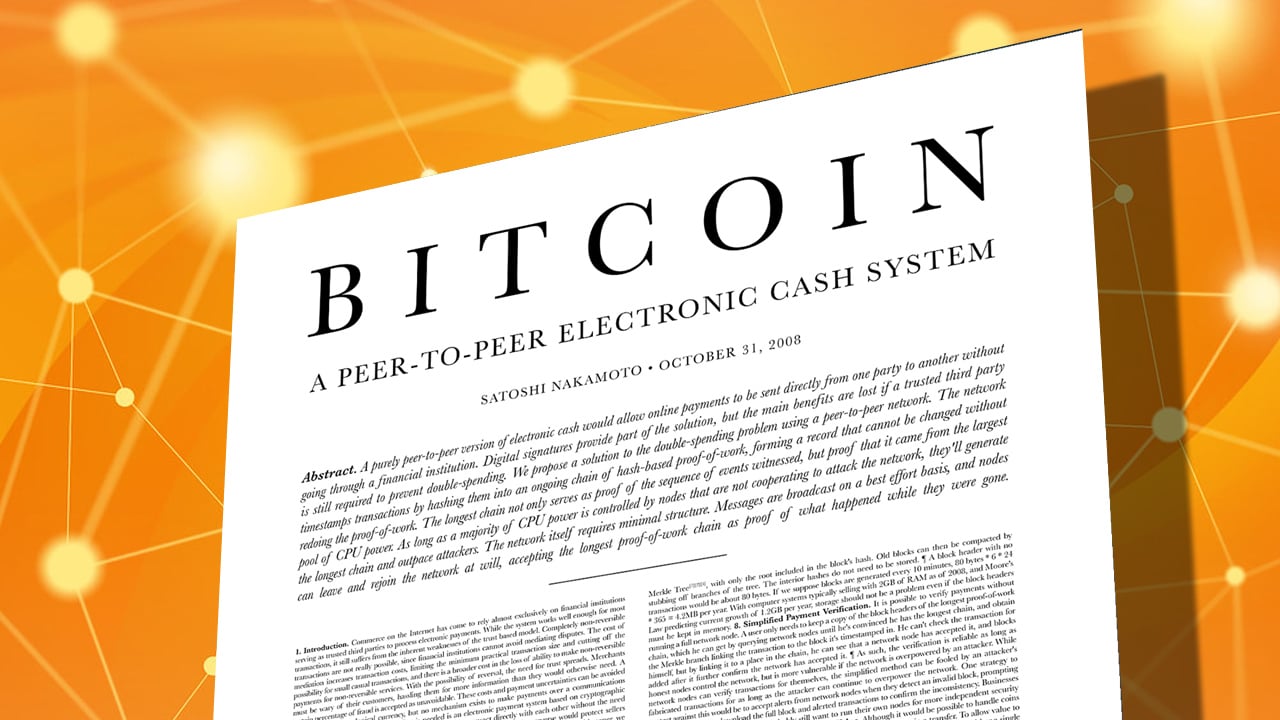
Former President Donald Trump is reportedly open to offering Elon Musk a cabinet or advisor position if he wins the presidential election in November. Trump reportedly told Reuters on Monday that the Tesla chief executive is a “brilliant guy” and said he “certainly would” consider Musk for a position. Musk endorsed Trump in July, hours […]
The post Donald Trump Plans To Offer Bitcoin Advocate Elon Musk Cabinet Position if He Wins Presidential Race: Report appeared first on The Daily Hodl.
 Approximately 14 years ago today, on Halloween, Satoshi Nakamoto introduced Bitcoin to the world by sharing the renowned white paper. Satoshi’s invention, shared on metzdowd.com’s Cryptography Mailing List, not only solved a problem that had plagued computer scientists for years, but the invention also redefined how people look at money. Furthermore, as a side effect, […]
Approximately 14 years ago today, on Halloween, Satoshi Nakamoto introduced Bitcoin to the world by sharing the renowned white paper. Satoshi’s invention, shared on metzdowd.com’s Cryptography Mailing List, not only solved a problem that had plagued computer scientists for years, but the invention also redefined how people look at money. Furthermore, as a side effect, […]
Billionaire and business magnate Elon Musk is once again praising dog-themed crypto asset Dogecoin (DOGE). In a lengthy new interview with podcast host Lex Fridman, Musk says that the popular meme coin’s built-in mechanisms render it superior to leading crypto Bitcoin (BTC) in terms of practical use cases. “Part of the reason why I think […]
The post Billionaire Elon Musk Says He’s Identified Which Crypto Asset Is Fundamentally Best – But There’s a Catch appeared first on The Daily Hodl.
 All around the world cryptocurrency supporters and proponents of blockchain technology are celebrating the 13th anniversary of the Bitcoin white paper. The summary of the inventor’s creation was published on metzdowd.com’s Cryptography Mailing List on Halloween 2008, as it gave birth to an asset with a market valuation of over $1 trillion and sparked the […]
All around the world cryptocurrency supporters and proponents of blockchain technology are celebrating the 13th anniversary of the Bitcoin white paper. The summary of the inventor’s creation was published on metzdowd.com’s Cryptography Mailing List on Halloween 2008, as it gave birth to an asset with a market valuation of over $1 trillion and sparked the […]
“What the hell is the point of Bitcoin?” asks Cardano founder Charles Hoskinson.
In a recent interview with Lex Fridman, Charles Hoskinson, the founder of Cardano and co-founder of Ethereum offered his views on Bitcoin. The 33-year-old was less than complimentary, calling it “slow” and in desperate need of an upgrade. Hoskinson also took issue with the recent Bitcoin conference in Miami, comparing the whole thing to a ridiculous religious movement.
“I can't for the life of me understand, what the hell is the point of Bitcoin?” asked Hoskinson.
But while Bitcoin has proven itself an adaptable blockchain with a decade of history, many within the crypto industry have significant questions about the “point” of Hoskinson’s own project, Cardano.
A week before this interview aired, Vitalik Buterin sat down with Fridman for a lively discussion. The Russian-Canadian programmer was asked about Cardano, and whether or not he thought Hoskinson’s project had a future. Buterin criticized Cardano’s reliance on the peer review system. Instead of focusing on academic proofs, Buterin favors a more heuristic approach. This was a sly dig, a super-geek mic drop.
Related: Bitcoin is ‘own worst enemy’ and will lose to Ethereum: Charles Hoskinson
For those unfamiliar with Cardano, the idea of peer review is very much a leitmotif of the budding proof-of-stake blockchain platform. This, we’re told, has investors excited. And so it should, in an ideal world. Peer-review is the principal metric by which scholarly legitimacy is measured. For progress, the evaluative process is invaluable.
With Cardano, it has been suggested that the term 'peer review' is little more than a clever marketing ploy, an ingenious way of giving the proof-of-stake blockchain platform an air of superiority. Yet Hoskinson is a staunch advocate of peer review and fiercely defensive of any criticisms that come its way. He appears to be fully invested in academic proofs. But is this a smart investment?
When one actually examines the state of today’s peer-review system, the answer appears to be no. After all, the peer review system, we're told, is positively “toxic.”
Last year, David Rosentahl, a highly respected British-American scientist, wrote an article titled Breaking: Peer Review is Broken. As Rosentahl argues, peer review has been in a ruinous state for well “over a decade,” with cases of fraud occurring on a regular basis.
As Science magazine warned back in 2018, “the number of articles retracted by journals'' has “increased 10-fold during the previous 10 years,” with fraud accounting “for some 60% of those retractions.” Three years on, things don’t appear to be getting any better. If anything, they are getting worse.
Across the board, from math to social sciences, the peer review system continues to be plagued by biases and tribalism.
John Baumgardner, Ph.D., asks the following, “Are there circumstances in which the scientific method ought to work, but for which the method does not provide ‘an accurate representation of the world’ — that is, a correct description of the way things really are?” Unfortunately, Baurngardner concludes, “the answer is yes.” To paraphrase Freemason Dyson, science is more mystery than truth.
What the hell is the point of Cardano?
If Bitcoin is nothing but an overzealous religious movement, what is Cardano? Fridman put this question to Hoskinson, who then proceeded to speak for 9 straight minutes outlining the ways in which Cardano gives "digital identities" to people in developing countries.
Others, however, see Hoskinon’s brainchild as something far less noble. According to Galaxy Digital CEO Mike Novogratz, Cardano is a “cult,” and a “weird” one at that. By default, this would make Hoskinson a cult leader.
Whatever the pros and cons of the technology that underpins the Cardano blockchain, and whatever Hoskinson’s loyal followers may see that’s worth investing in, the concern is that the cult of science is very real — and that an overreliance on the peer review process could prove to be highly problematic.
The irony of Hoskinson’s argument is that while Satoshi Nakamoto may not have jumped through peer review hoops to promulgate his white paper, the market itself has already passed judgement on Bitcoin. If peer review is “the evaluation of work by one or more people with similar competencies as the producers of the work” then Bitcoin has been reviewed positively for a decade by some of the most talented developers in the world.
Certainly it has its critics. Certainly it has its flaws. But exposure to the real world forged Bitcoin’s resilience. And whether Cardano will survive in the heat of real world usage is still a matter for some debate — as tech historians love to remind us, Betamax technology was superior to VHS, too.
The views, thoughts and opinions expressed here are the author’s alone and do not necessarily reflect or represent the views and opinions of Cointelegraph.